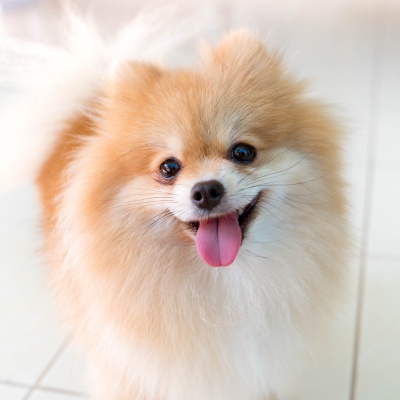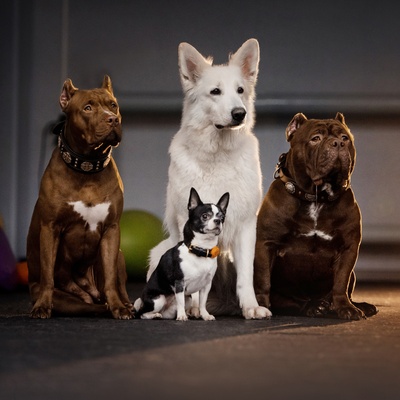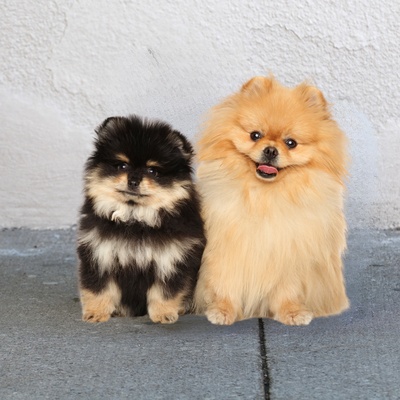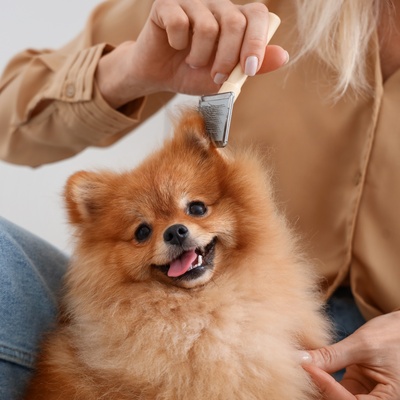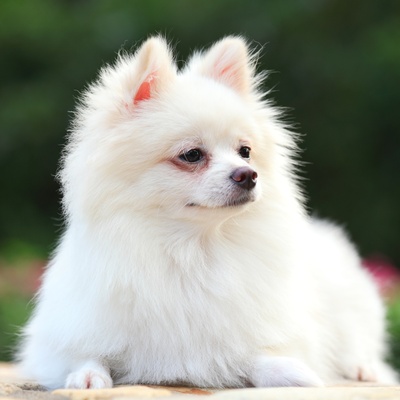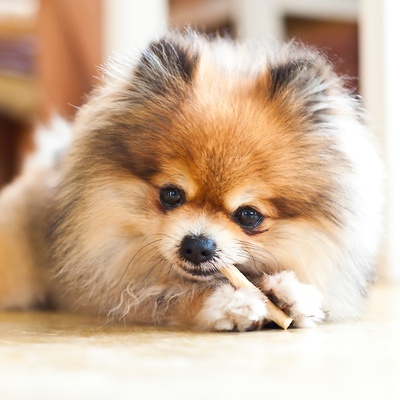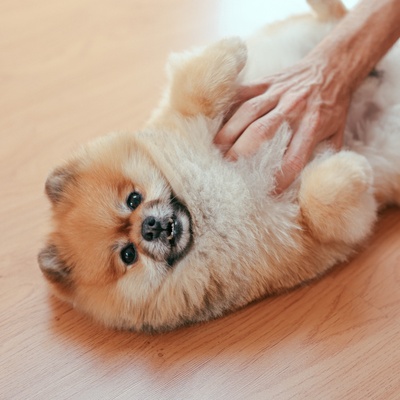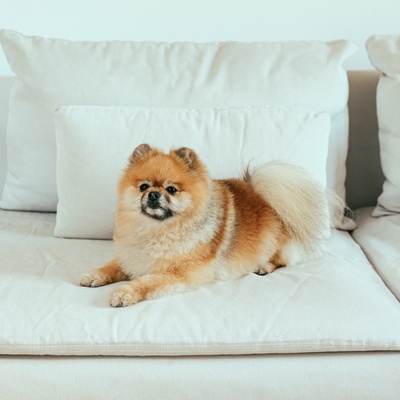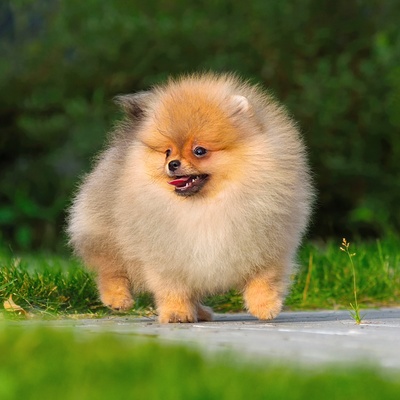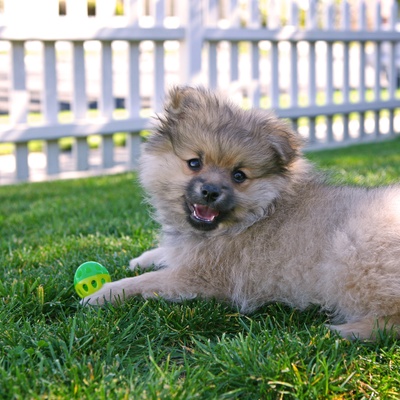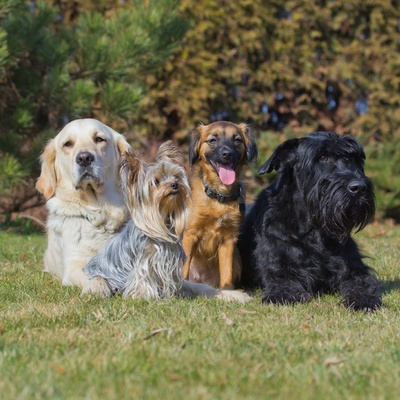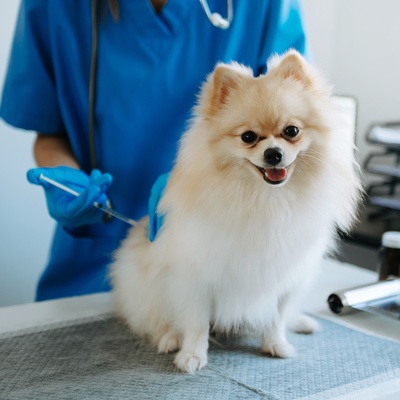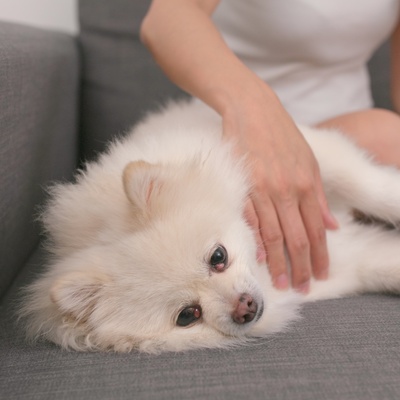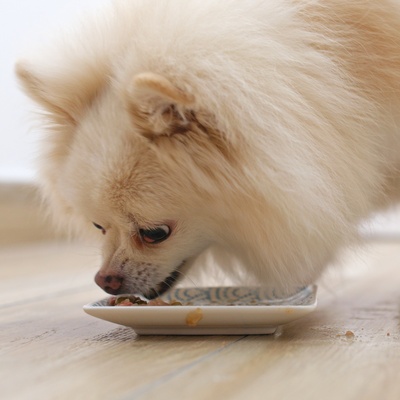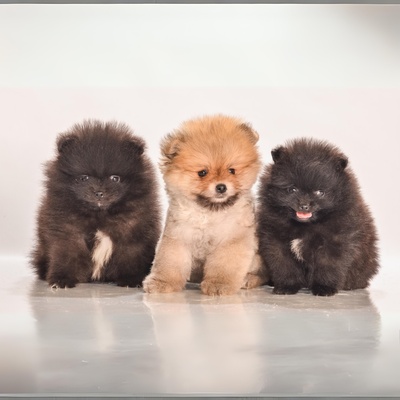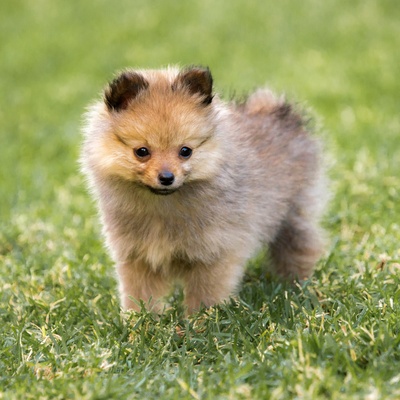Introducing the Pomeranian
Discover all there is to know about the Pomeranian: its characteristics, behavior, training, and its cost.
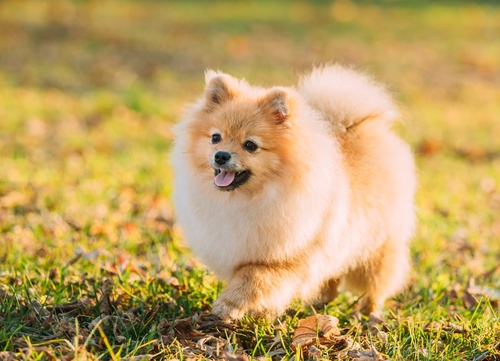
Discover all there is to know about the Pomeranian: its characteristics, behavior, training, and its cost.
The Pomeranian's roots trace back to the icy landscapes of the Pomerania region, located between modern-day Germany and Poland. This small yet fierce breed was once a larger sled-pulling dog before being miniaturized into the fluffy lap dog we adore today. Its global appeal is undeniable, with the Pomeranian consistently ranking among the most cherished dog breeds, especially in the United States.
Pomeranians are energetic and versatile, excelling in shows and companionship. Despite their small size, they're bold and confident, thriving on social interaction and showing affection with licks and cuddles.
This section presents the distinctive characteristics of the Pomeranian breed.
Pomeranians belong to the Toy group, group 5, home to small-sized breeds known for their affectionate and sociable nature. They are prized for companionship and their ability to fit into various lifestyles.
Pomeranians are tiny but charismatic. Generally, they stand 6 to 7 inches tall at the shoulder and weigh between 3 to 7 pounds.
Pomeranians boast a luxurious double coat. The undercoat is soft and dense, while the outer coat is longer and textured, giving them their distinctive fluffy appearance.
Pomeranians come in a rainbow of colors. While some sport a solid hue, others can be parti-colored. Common colors include orange, black, white, and cream.
Pomeranians are adaptable and can thrive in apartments as well as houses, as long as they receive adequate exercise and attention.
Pomeranians are generally friendly and outgoing. They are typically good with children and can get along with other pets if properly socialized.
Pomeranians are generally robust but can be prone to certain health issues such as dental problems and luxating patella. Regular vet check-ups are essential.
Pomeranians are intelligent and eager to please, making them relatively easy to train. Positive reinforcement techniques work best with this breed.
We can help!
Every dog has its own character, and so do you. Making the right choice will ensure his well-being and yours.
Take our quiz to find out which breed is right for you, based on your personality, lifestyle, location and many other criteria.
Don't wait any longer and take the quiz to find out the answer!
The Pomeranian is a small breed, striking a perfect balance between dainty and robust. With their fluffy coat and a face resembling a tiny, animated fox, they exude both elegance and playfulness.
Pomeranians are among the smallest dog breeds. Females typically stand between 6 to 7 inches tall, while males can be slightly taller. In terms of weight, females usually weigh between 3 to 6 pounds, and males can weigh up to 7 pounds.
Pomeranians grow rapidly in their early months. They tend to reach half their adult size by about 3 to 4 months of age. By their first birthday, most Pomeranians have achieved their full size and weight, making their growth journey swift and delightful to witness.
The Pomeranian sports a double coat, featuring a short, dense undercoat and a long, straight outer coat. This luxurious fur is particularly plush around the neck and chest, forming a distinctive “ruff” that adds to their regal appearance. The texture of the coat is both fluffy and sturdy, creating a striking visual effect.
The Pomeranian breed boasts a diverse palette of coat colors. Common hues include orange, cream, black, blue, and white. However, Pomeranians can also be found in more unique shades like chocolate, sable, and even a combination of colors known as parti.
The Pomeranian's coat, while visually stunning, demands regular grooming. Their dense double coat sheds year-round, with increased shedding during seasonal changes. Regular brushing, ideally several times a week, is crucial to prevent matting and to maintain the coat's fluffiness and shine.
Bathing the Pomeranian every 1 to 2 months is generally sufficient, but the frequency can be adjusted based on their activity level and lifestyle. Despite the volume of their fur, Pomeranians are relatively easy to keep clean and looking their best with consistent care.
The Pomeranian is the epitome of a balanced and well-proportioned small dog. Its foxy, wedge-shaped head features a relatively short muzzle and a pronounced stop. Sparkling, almond-shaped eyes, typically dark in color, lend an expression of keen curiosity. The small, erect ears are set high on the head, adding to their alert appearance.
Despite their diminutive size, Pomeranians possess a sturdy body with a short, straight back, and they can exhibit a surprising level of musculature for their size.
The Pomeranian is a delightful blend of spirited vivacity and devoted affection, offering a warm and lively presence in any household.
Out of the more than 400 recognized dog breeds, classified into 10 distinct groups, each group represents breeds with similar traits and functions. The Pomeranian belongs to group 5, which comprises Spitz and primitive types of dogs. This group includes a diverse array of breeds, from the Alaskan Malamute to the Shiba Inu.
Breeds in this category are known for their robust nature and adaptability, often thriving in various climates and conditions. They typically exhibit keen alertness, intelligence, and a strong instinctual background. The Pomeranian, in particular, showcases these qualities with its bright intelligence, alert demeanor, and a surprising level of bravery for its size.
The Pomeranian, with its diminutive size and grand personality, is a vivacious and lively companion. These dogs are not just playful and curious; they also form deep attachments with their owners. Their endearing and affectionate nature makes them delightful companions.
However, these pint-sized pets do best with an owner who can offer consistent attention and care. While they can exhibit a degree of independence, Pomeranians thrive on interaction and engagement with their loved ones.
Known for their outgoing and friendly demeanor, Pomeranians are not just generous with their affection; they are also remarkably sociable. They generally get along well with humans, including both familiar faces and new acquaintances.
Pomeranians can be excellent companions for children, provided they are introduced and socialized appropriately from a young age. Their sociable nature and eagerness to please make them adaptable to various social situations, but it's important to nurture their social skills early on to ensure they grow into well-rounded adults.
The Pomeranian is a remarkably adaptable breed, capable of thriving in diverse living situations. Whether residing in a cozy apartment or a spacious house, in the bustling heart of a city or the tranquility of the countryside, these little dogs adjust well.
However, what they need most, regardless of their environment, is the attention and affection of their owners. Pomeranians are companion dogs through and through and love being part of family activities. Daily walks are essential for their well-being, with a recommended duration of about 20 to 30 minutes each.
Despite their small size, Pomeranians have an energetic and curious nature. Having access to an outdoor space, even if it’s just a small yard or balcony, allows them to explore and burn off excess energy. These tiny explorers enjoy sniffing around and discovering new sights and sounds, so providing them with opportunities to indulge their curiosity outdoors is beneficial.
However, due to their small size, it’s important to ensure their outdoor adventures are in a safe and secure environment.
Despite their small stature, Pomeranians are known for their remarkable intelligence and eagerness to learn. These pint-sized pooches have an excellent capacity to absorb and retain commands, making training sessions generally smooth and productive.
However, due to their spirited and sometimes independent nature, training a Pomeranian may require a bit of patience and consistency. Positive reinforcement and reward-based methods work wonders with this breed, as they respond well to praise and treats. To ensure safety and prevent any unexpected wandering or escaping, equipping a Pomeranian with a GPS collar can be a wise decision, especially during outdoor activities.
Pomeranians often display impressive listening skills, making them receptive to training. However, their personality can sometimes lean towards the sassy side, which may pose challenges during training sessions.
Understanding their unique character and adapting the training approach accordingly is key. Using short, engaging, and fun training exercises can help keep their attention and maintain their interest. It's important to remember that while Pomeranians are bright and capable, they also have a streak of independence and can be a bit headstrong. Patience and gentle guidance are crucial in their training journey.
Take the test and find out the dog breed that matches your personality and lifestyle.
Pomeranians are typically healthy with proper daily grooming and attention to prevent diseases. Regular vet visits are important, but daily care is essential for their well-being.
Pomeranians are typically robust little dogs with good overall health. However, they do have predispositions to certain conditions. These include dental issues due to their small mouths, luxating patella (a condition where the kneecap dislocates), and tracheal collapse, a condition that affects their airways.
Some may also be prone to skin allergies and eye problems. The symptoms associated with these conditions can vary, but awareness and early intervention are key. The typical lifespan of a Pomeranian ranges from 12 to 16 years.
Regular veterinary care is paramount for a Pomeranian's health, including vaccinations, deworming, and parasite treatments as recommended by your vet. Beyond these, daily care is essential for their well-being. This includes brushing their thick double coats daily to prevent mats and tangles, regular ear cleaning to prevent infections, dental care to avoid periodontal diseases, and nail trimming.
It's important to note that Pomeranians are not considered hypoallergenic.
Every dog breed has unique nutritional needs, and the Pomeranian is no exception. Ensuring a balanced diet is essential for maintaining their vitality and overall health. Pomeranians, with their small stature, require a diet rich in proteins and vitamins to meet their nutritional demands. High-quality kibble formulated for small breeds is recommended as it provides a balanced dietary foundation tailored to their needs. In cases where additional protein is required, especially for more active Pomeranians, supplementing their diet with lean white and red meat can be beneficial.
However, it's important to limit fats to avoid weight gain. Pomeranians can be prone to obesity, so monitoring their diet and maintaining set feeding times are crucial for their well-being.
The Pomeranian is a popular and esteemed breed. Before adopting, consider key factors and carefully choose from the available breeders.
Adopting a Pomeranian requires thoughtful consideration of several factors. First, it's essential to find a reputable breeder. A visit to the breeder's premises is necessary to observe the living conditions and behavior of the dogs, ensuring they are well-cared for. Check the health of the puppy and its parents; reputable breeders should provide transparent information about the current health status of the puppy and any illnesses in its lineage.
Lastly, mandatory electronic identification, like microchipping, is not always mandated at the federal level in the United States for cats and dogs. But microchipping is widely acknowledged as a successful way to permanently identify pets and increase the possibility of reuniting lost pets with their owners, even in the absence of universal regulations.
As a pet owner, it is advised to inform yourself about municipal laws to ensure the safety and wellbeing of your pet.
The acquisition cost of a Pomeranian puppy can vary based on several factors. Factors influencing the price include lineage, pedigree, the breeder's reputation, and the age of the dog. On average, a Pomeranian puppy may cost anywhere from
to
, but this can vary significantly.
In addition to the initial cost, maintaining a Pomeranian involves ongoing expenses for their care. The estimated annual expense for food, veterinary care, grooming, and other necessities can range from
to
, depending on individual circumstances and needs.
Choosing a dog that matches your personality and lifestyle will ensure your well-being and his!
To access the most relevant information, suitable payment methods, and delivery in your region, please select the website corresponding to your country.
